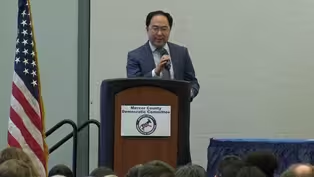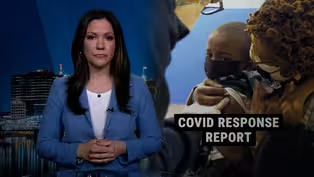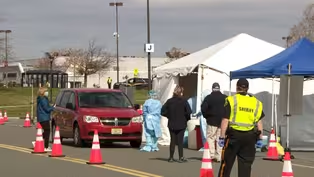NJ Spotlight News
NJ Spotlight News: March 12, 2024
3/12/2024 | 26m 46sVideo has Closed Captions
Watch as the NJ Spotlight News team breaks down today’s top stories.
We bring you what’s relevant and important in New Jersey news, along with our insight. Watch as the NJ Spotlight News team breaks down today’s top stories.
Problems playing video? | Closed Captioning Feedback
Problems playing video? | Closed Captioning Feedback
NJ Spotlight News is a local public television program presented by THIRTEEN PBS
NJ Spotlight News
NJ Spotlight News: March 12, 2024
3/12/2024 | 26m 46sVideo has Closed Captions
We bring you what’s relevant and important in New Jersey news, along with our insight. Watch as the NJ Spotlight News team breaks down today’s top stories.
Problems playing video? | Closed Captioning Feedback
How to Watch NJ Spotlight News
NJ Spotlight News is available to stream on pbs.org and the free PBS App, available on iPhone, Apple TV, Android TV, Android smartphones, Amazon Fire TV, Amazon Fire Tablet, Roku, Samsung Smart TV, and Vizio.
Providing Support for PBS.org
Learn Moreabout PBS online sponsorshipANNOUNCER: major funding for NJ Spotlight News is provided in part by, NJM Insurance Group.
serving the insurance needs of residents and businesses for more than 100 years.
And by, the PSEG foundation.
♪ BRIANA: Tonight on "NJ Spotlight News," Under-prepared for the next public health emergency.
A deeper dive into the nearly thousand-page COVID response report reveals the state is lacking proper funding and resources to battle our next outbreak.
>> You have to build the trust.
These reports really talk about this student retook about how you build a public health workforce that will be equipped to work with people because people are making the decisions that make these pandemics spread.
Briana: Plus, Congressman Andy Kim is the big winner in Mercer County.
The momentum to replace Senator Bob Menendez shifting back in his favor for now.
>> Any convention where we have seen the just has an open process, secret ballots and not under all sorts of other random delegates at the last minute, I seem to be doing just fine.
BRIANA: Also, notice sun launches a community court program as an alternative to jail for low level nonviolent offenders.
>> This is bringing justice to all.
Justice for all.
And I think that the community, the Black and Brown community the think that we don't think on them, we are thinking on them.
BRIANA: And, Edge NJ, a safe haven to end discrimination, gain equality for members of the LGBTQ+ community meeting care or housing.
"NJSpotlightNews" begins right now.
♪ ANNOUNCER: from NJPBS Studios, this is "NJ Spotlight News" with Briana Vannozzi.
BRIANA: Good evening and thanks for joining us this Tuesday night.
I am Briana Vannozzi.
A massive independent review of the state's COVID-19 response finds New Jersey's lack of preparedness led to unnecessary deaths and suffering.
The long-awaited review out this week fulfills Governor Murphy's promise to provide a postmortem on the most interest endemic in a century -- most dangerous pandemic in a century which sickened nearly 3 million people statewide and killed more than 33,000.
The roughly 1000-page report gives credit to the pandemics heroes, but criticizes the state government for a patchwork response that hit the most vulnerable in New Jersey the hardest.
As Senior correspondent Brenda Flanagan reports, it reveals that even in the years since, the state still hasn't come up with a future emergency plan.
>> Leadership.
Leadership would have made a difference.
Reporter: Jay spent anxious hours at jerseys, veterans homes demanding action as COVID first surge cut through the state run facilities in Menlo Park and Paramus, killing almost 200 residents in April alone.
By September, grieving families and angry staff knew that something was very wrong.
>> Horrible.
Horrible.
They want us to work without masks because it is going to scare the residents and when we see there just dropping like flies, that is breaking our heart.
Reporter: State officials witnessed the tragedy unfolding at the veterans homes and the long-term care facilities where more than 16,000 died, most of them elderly and vulnerable.
The governor promised a full accounting, which arrived this week in a massive report which documents New Jersey's response to the pandemic.
At the two veterans homes, it found systemic failures.
For infection control, lack of employee confidence in leadership, and management incompetence.
>> Menlo Park and Paramus at the beginning had soldiers running those facilities.
They didn't have the Nicole health care background whatsoever.
>> But if we would have had some skilled leaders in those positions, I think we could have minimized the impact, that there could have been for some fragile individuals that passed away unnecessarily, I feel.
Reporter: The report blames the federal government for failing to provide critical guidance, and says COVID caught New Jersey's healthcare system off guard and woefully unprepared.
It notes that by February, the virus was already out, spreading like wildfire through the community, infecting long-term care centers.
>> There is an admission of things that went right, and things went wrong.
We should have been reacting in real-time to those situations, and we weren't.
How does the report tell us about how to do that effectively in the future?
I don't think it tells us that.
At all.
Reporter: It does describe how patients overwhelmed hospitals already struggling to find protective gear.
So health officials hoarded masks for medical centers, and in the early months, nursing homes went without.
David was an assistant health commissioner during the pandemic.
Nobody had enough PPE.
>> I think that is one of the really important things that stressed in the report, which is that preparation and proper stockpiling is going to be important not just for New Jersey, but also for all other states, and in particular, the federal government.
Reporter: The report commends the governor's quick response looking down the state and closing schools, but it adds leading individual districts decide when to open classrooms contributed to learning loss, because urban districts couldn't provide the required Social distancing.
Overall, COVID hit a low income minority communities much harder, underscoring pre-existing inequities, the report says.
>> I think you talked about employment status, for example, and how certain acute patients were more likely to be exposed and have less access to health care.
Those were almost, at least early on, largely occupied by communities of color and the low income population.
Reporter: The NJEA responded to the report, noting, "we believe that in-person instruction is the gold standard for effective teaching and learning, but that had to be balanced against the very real health risks of in -person instruction early in the pandemic, particularly before vaccines were universally available."
The report also says state officials fail to activate an existing flu pandemic plan, leaving local health departments scrambling.
Even after coping with COVID for the four years after, the report concludes that New Jersey is not ready for the next pandemic.
>> We need to build trust.
And none of these reports talk about how you build up a public health workforce, because people are making the decisions that make this pandemico spread public health experts hope the administration learns from the deadly mistakes made by this one.
I am Brenda Flanagan, NJ Spotlight News.
BRIANA: New Jersey did have a statewide influenza pandemic plan and of the playbook to deal with other large-scale health hazards, but those resources weren't of much value during the coronavirus outbreak because according to the report, most state leaders weren't aware it strategy existed.
And very few in the higher echelons of government had ever been trained on it.
That was perhaps one of the most glaring examples of how New Jersey field to respond to the outbreak.
Our health care writer, Liles tainted joins us now for an in-depth look.
Lilo, I don't think anyone can deny that this is a very thorough report, it almost 1000 pages.
But what struck out to you about different areas of the pandemic response?
GUEST: one of the things that stuck out was the totality of it.
It really was comprehensive, and it went back as far as, there was an entire section on planning which I was really struck by, and it went all the way back to the 1918, 1920 pandemic that really has been seen in a lot of ways as a model for responses and has really informed a lot of the United States Public health decisions since then.
So I was struck by the fact that the state did have a lot of plans, but also that none of them seemed to be particularly appropriate for this scenario, and that none of those plans really came up.
BRIANA: Yes, I think that was the question that a lot of us, as we were reading this report, were asking, why.
It went into great detail about how after the scares from Ebola, and in 2015 with the influenza pandemic plan, and yet state leaders weren't made aware that these plans existed in the government did not implement them.
So why was there such a lack of preparedness when there were tools apparently at their disposal?
Guest: It's a hard question to answer.
A great question.
Part of it has to do with the nature of public, health local public health officials constantly stressed to me that the work we do, when we are doing it right, we remain invisible.
Right?
It's about prevention.
So if you don't see illnesses, if you don't see diseases, then you know their work is going well.
This was a situation where we were overwhelming our public health structure.
Another thing that struck out to me in the report was that Paul Zu back, the attorney noted that they went into the details of the different emergency laws and plans that could have been applicable, and a lot of them put the Department of Health in the driver's seat in this type of situation, but none of them equipped the Department of Health or local Health Departments with the resources,.
Contrary Post-09/11, we saw a lot of law enforcement counterterrorism and biohazard-type threat build up in response to that.
Law enforcement agencies appeared to do a lot with that.
So the question as to why we can't build a complementary public health system defense like that, I don't know.
BRIANA: So lack of investment in the public health infrastructure.
But did we get any insight on what metrics, if any, were being used by the administration when making the decisions that they did?
Guest: That was something one of the recommendations was something that said we need clearer metrics for decision-making.
In the report, the attorney credits the Murphy administration for doing the robust response that they did.
But he points out several places that if Governor Murphy, the Health Commissioner and the current state police Colonel hadn't gotten along, and they got along famously, it appears -- if that hadn't been the case, none of this would have worked.
What if one of them have gotten sick?
What if Murphy's cancer surgery had gone wrong?
Not to say that the Health Commissioner couldn't have led this, but the sort of contingency plans were not there.
A lot of things that happened in this pandemic or because people stepped up and did extraordinary things.
But what if they hadn't?
BRIANA: Relying on a lot of luck there.
Lilo Stainton, thank you very much.
Guest: Thank you.
BRIANA: It is a lucky number seven for U.S. Senate candidate and Congressman Andy Kim who Last night won the Mercer County Democratic Convention with 63% of the vote.
Beating out first lady Tammy Murphy for the partyline endorsement there.
Both candidates have been racking up critical support heading into the June primary.
But political analysts say they are watching closely for victories in counties like Mercer, where endorsements are decided through secret ballot votes rather than the thumb of party bosses.
Ted Goldberg reports.
>> For Tammy Murphy, 108 votes.
For Andy Kim, 230.
[CHEERS AND APPLAUSE] >> Anytime we show that we are able to operate in a non-machine County, where we let people be able to vote, we are able to win very significantly and I think this bodes really well for what will happen on June 4.
Reporter: Another secret ballot and another convention win for Andy Kim who has now captured the County line in seven counties.
Kim had home-field advantage with much of his Congressional District in Mercer County.
The county also includes Trenton, so you couldn't count out first lady Tammy Murphy.
>> I am here standing before you not just as a candidate in the seventh, not just as a three term member of the House of Representatives, but as the father of a six-year-old and eight-year-old referred about what kind of America they are going to grow up in.
>> I see the world through the eyes of my children, and we are really laying down the next generation, whether it is the two wars ongoing, the mental health challenges, whether it is affordability, whether it is the attack on our referred active freedoms.
Reporter: Murphy only needed 40% of the vote, but she ended up with just 29% of the vote, so Kim gets the lion solo.
Afterwards, Murphy said she is not too worried about conventions, even after her big wins in Bergen and Somerset Counties, and getting the party's endorsement in Passaic and Union.
>> There is a lot of conventions.
But I would be happy when the conventions are over and we can just get on the ground and be able to talk to people.
That is where I shine.
Not just running from one place to the other and not able to really have good conversation.
Reporter: As for Kim he was pleased that Mercer County used a secret ballot.
Secret ballot conventions have leaned his way during the campaign.
>> Anytime we have used an open process secret ballots and not , adding all sorts of other random delegates at the last minute.
I seem to be doing just fine.
There should be really no reason not to do a secret ballot anywhere in America when there is a contested race.
It just is the right thing to do to just make sure people are able to do what they want to do.
It is a sign of respect for voters.
>> When you know you are being watched by people who have a vested outcome in how you vote, it's not so secret, it's not so easy to vote your conscience.
Reporter: Last night convention was held at Rider University where Michael Rasmussen teaches political science.
He says these results demonstrate the hold Kim has in his home district.
>> To me, that signals that Andy Kim has very strong support throughout all the four counties that touch his Congressional District or that he used to represent in Congress.
He has got a very strong base in Monmouth, Ocean, Burlington and Mercer.
Reporter: while Kim got the Democratic nod in Mercer County, neither candidate could claim victory in Cape May County.
The Democrats there chose not to endorse him or Murphy for the county line.
Rasmussen says the next few conventions will be an interesting battle between Kim and the Democratic machine.
>> This is really shaping up to be a primary very much about those who have the power versus those who don't, and there are a lot more voters who don't have power and, ultimately, if they choose to dissipate, then Andy Kim has this strong grassroots secret weapon on his side.
Reporter: Kim hopes to ride this wave into Middlesex County where delegates there will cast their votes on Thursday at Rider University.
I'm Ted Goldberg.
NJ Spotlight News.
BRIANA: In Paterson, an alternative to jail for some low-level, nonviolent offenders.
The city this week launched a community Court program that will offer people a second chance for they get caught up in the criminal justice system by intervening with services like mental health care, substance abuse treatment, and job training.
As Melissa Rose Cooper reports the program is considered it was formative approach to help people get and keep their lives on track.
>> Paterson is a city of second chances.
And improving public safety requires a compassionate and holistic approach.
This is the last piece to what we are trying to do.
Reporter: Paterson Mayor Andre Sayegh, uploading the city's leaders program to foster rehabilitation and further empower its residents.
The community courts initiative will give those who have committed low-level nonviolent crimes a way to get back on the right path without facing arrest.
>> Ultimately, our objective is to provide access to resources that may not have been readily available in the past.
But now, City Hall is essentially becoming a one-stop-shop.
For people who have been recently released from prison or jail, for people that unfortunately, are struggling financially, for people that have been struggling with addiction for far too long, and now for people who get caught up in the criminal justice system, not only clog the courts, but also impaired their opportunities to advance in society.
So I mean it when I say that the creation of a community court in Patterson represents a victory for those individuals whose only crime was that they didn't have the connection.
Reporter: The program is being made possible with the help of a $600,000 grant from the U.S. DOJ, and will operate within the Paterson Municipal Court.
>> There will be a screening process and the individuals will go through that screening process and it will include members of the community court staff as well as their attorneys , the defense attorneys, our persecutors.
And, again, the goal is to start with this, but maximize it.
What I mean is that people who have large fines.
People who may have suspended licenses.
We want the Community court to be a place where people can come and seek redress for those issues without having to be arrested with minimizing the amount of contact with our law enforcement partners.
So that our court is a place were not only people can go in, but they could also come out and come out and continue their lives in a meaningful way.
Reporter: The community court will include a dedicated team of professionals specializing in behavioral health and social services to ensure residents who have been charged with a low-level crime, get the proper attention they need.
>> Am a licensed mental health and counselor and a licensed counselor in the state of New Jersey.
My research experience has included the understanding quality-of-life issues that affect communities of color as well as informing political research, policy research around increasing access to mental health care and rehabilitative services.
I look forward to leading these initiatives and I, want to focus on connecting this community to vital resources to address the root causes of their cases.
>> This is bringing justice for all.
Justice for all.
I think the community, Black and Brown community that think you don't think on them, we are thinking on them.
Because most affected are our black and black communities.
Let's be honest.
We are thinking on them.
We are bringing justice for all.
Take the chance and the opportunity that the city is giving you to be a better person tomorrow.
Reporter: Plans are also in the works to expand the community court to include other services, like enrolling people in community college so they can take the next steps in reaching their goals.
For NJ Spotlight News, I am Melissa Rose Cooper.
♪ BRIANA: In our Spotlight on Business Report tonight, if you want to know which bills got the most attention in Trenton last year, just follow the money trail.
An annual report from New Jersey Election Law Enforcement Commission, shows government lobbyists spent just over $96 million in 2023.
That is up slightly from the roughly $95 million they spent the year prior.
No surprise here that last year's state budget attracted the most lobbying activity.
But according to the spending report, there was also outsized interest in legislation related to reforming drug prices.
State liquor license laws, and protections for temporary workers.
So who were the top spenders?
According to the ELAC records, the operating engineers Union and PSE&G held the number one in and two spots, followed by groups like AARP New Jersey, and the league of municipalities.
PSE&G is a funder of NJ Spotlight news.
On Wall Street stocks marched , higher today after new inflation data showed consumer prices were up more than forecasters expected.
An increase of 0.4% in February, and 3.2% higher than a year ago.
That's being led by a rise in the price of gas and shelter.
Food prices remained flat.
Here is how the markets reacted.
ANNOUNCER: support for the Business Report provided by the New Jersey Chamber of Commerce , announcing its New Jersey business Summit and Expo on March 26 and 27th at Harrah's in Atlantic City.
Details online at njchamber.com.
BRIANA: Finally tonight, an organization founded decades ago to support people living with HIV-AIDS is serving a new purpose with a similar mission.
Edge NJ is now extending its services to the LGBTQ+ community.
It is the only pride and wellness center in Morris County offering health care, help with housing, and behavioral needs, services advocates say are severely lacking.
The office officially opened its doors after relocating to a new location, and our senior correspondent Joanna Gagis was there.
>> My kid came out during the pandemic and they were flourishing in their personality, until we ended up going back to school.
We encountered a lot of bullying because they were LGBTQ, and I needed to find resources.
Reporter: Maria and her child found that solace and support at a nonprofit in Morris County called Edge.
It stands for end discrimination, gain equality.
They are like so many who come here.
>> they are looking for a place to feel included.
They are looking for a place to be represented and they are not feel different.
They are looking for a space where they can have community.
Reporter: And that's exactly what Edge offers, says it's COO.
It started in 1994, serving individuals with HIV, but transitioned a few years ago to also serve the needs of the LGBTQ community.
>> We also see a lot of people who are also facing social determinants of health, lack of access to housing, lack of access to transportation, health care, mental health services.
Reporter: They have a housing program for young people ages 18-24 who find themselves homeless either because of discrimination, or because they have been kicked out of their parents' home.
They have programs geared specifically to young people ages 13-18.
>> Little to no cost counseling services, compassion, a listening ear, a space where they can feel safe and breathe, patience and nonjudgment.
That is all it takes.
It doesn't take more than that to be able to see the change, the life-change for these people once they are connected to care.
Reporter: Their licensed clinicians accept insurance, part of the reason why they have a 44 person wait list right now .
>> We have support groups as well.
We do a lot of linkage to affirming medical care.
Reporter: Six months ago, Edge had to vacate their office space, forcing them to go remote.
They just moved into a new space in pursue putting a week ago, and they are excited to bring in their services like counseling and peer support groups.
>> We just had our first game night last night and we had a mixture of youth and long-standing members who were so happy to be here.
They even wanted to record a video to send some of our higher ups here just to show the gratefulness that the space is open again.
Being remote and in between spaces, I think that was tough on some of our members because edge New Jersey is one of the only safe spaces for them to come and be a part of a community.
Reporter: And yet, even with the need so great, other LGBTQ organizations like can, a medical service provider, have recently closed their doors, only adding to the demand for support services from edge.
>> We know we don't provide the services they need, they are faced with tragic outcomes.
We lost one of our youth a year ago and it was horrible.
This could be prevented if there were more services available to our young people.
Reporter: Reporter: An alarming over 40% of LGBTQ youth considered committing suicide.
So for Maria, having this support for her child is life-changing.
>>.
>> If there is anything going on, the clinician lets me know and we start working on how do we resolve it?
How do we best support it?
For me, this is a good place to be.
Reporter:.
Reporter: There holding their first in-support group tonight in the new space, bringing back the support that so many have been missing.
Joanna Gagis, NJ Spotlight News.
BRIANA: That does it for us tonight, but don't forget to download the NJ Spotlight News podcast so you can listen anytime.
I'm Briana Vannozzi.
For the entire NJ Spotlight News team, thanks for being with us.
Have a great evening.
We will see you tomorrow.
♪ ANNOUNCER: New Jersey Education Association.
Making public schools great for every child.
And, -- RWJ Barnabas health.
Let's be healthy together.
♪
HIV/AIDS organization extends services to LGBTQ+ community
Video has Closed Captions
Clip: 3/12/2024 | 4m 15s | New center in Parsippany provides help with housing, behavioral health and case management (4m 15s)
Kim wins Mercer County Democratic convention
Video has Closed Captions
Clip: 3/12/2024 | 4m 22s | The congressman won 62% of the vote, first lady Tammy Murphy had 29% (4m 22s)
NJ’s COVID response comes in for harsh criticism
Video has Closed Captions
Clip: 3/12/2024 | 4m 54s | A report says administration’s hit-or-miss response to COVID-19 pandemic costs lives (4m 54s)
Paterson’s community court program focuses on rehabilitation
Video has Closed Captions
Clip: 3/12/2024 | 4m 20s | The program is for people who have committed low-level, nonviolent crimes (4m 20s)
Will NJ learn from its pandemic mistakes?
Video has Closed Captions
Clip: 3/12/2024 | 5m 10s | Gov. Murphy released a massive report that documents NJ’s response to the pandemic (5m 10s)
Providing Support for PBS.org
Learn Moreabout PBS online sponsorship
- News and Public Affairs

Top journalists deliver compelling original analysis of the hour's headlines.

- News and Public Affairs

FRONTLINE is investigative journalism that questions, explains and changes our world.












Support for PBS provided by:
NJ Spotlight News is a local public television program presented by THIRTEEN PBS




